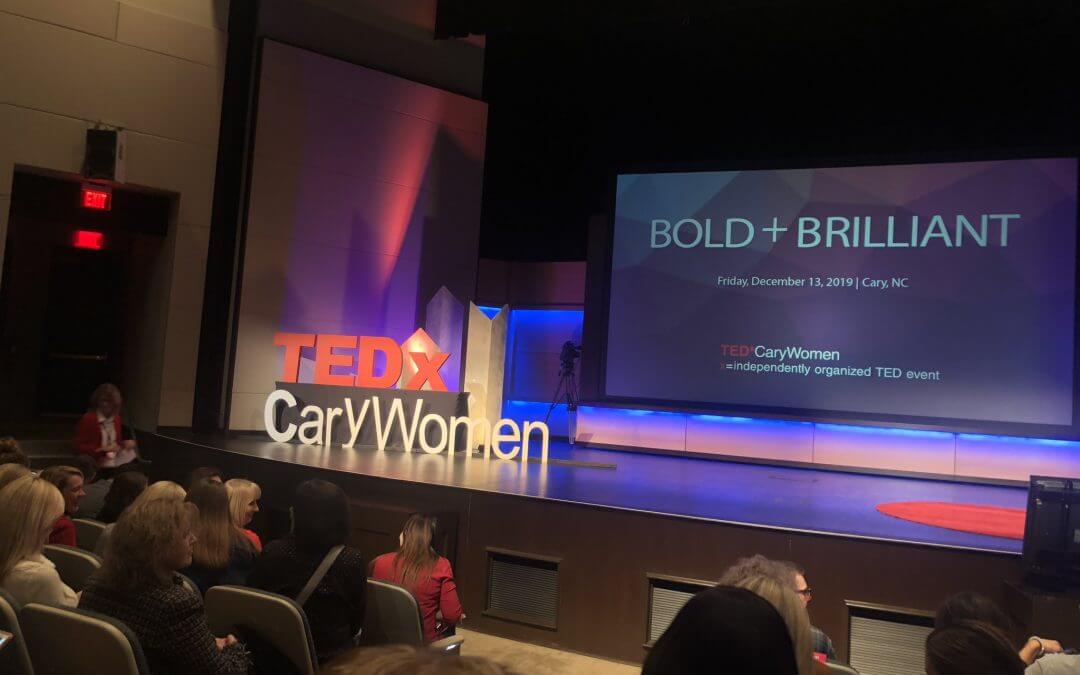Being a world-class speaker takes a lot of work. But regardless of whether you’re on the big stage or in the small conference room, the elements that make great communication don’t change.
Last month I had the privilege to work with world-class speakers at the TEDxCaryWomen program. Curator Stephanie Sarazin and I connected through a mutual colleague and I was happy to contribute my support as well as volunteer many of my friends I know in the speaking/coaching world. It was a mini speech coach reunion of sorts. Like my first foray into TEDx (Raleigh, 2016), the group became close through the shared experience and the energy in the room (400 people cheering makes it a little more exciting for everyone involved). It was also a trip down memory lane – the venue was hosted by my old employer, and the stage was one I had presented on several times while there. Some of the biggest speeches I gave were in that room.
TED/TEDx (the local version) is a great place to see high-end, world-class speakers. I would encourage anyone studying speaking to watch TED speeches. They’re not all great or a world-class speaker. Far from it. But they’re better than average.
Here are some observations about how to be a world-class speaker:
-
Opening lines are critical
I’m not a fan of announcing a coming talk or story (e.g. “I want to tell you a funny story.”) We call that “Talking about talking”. Instead, just start with a time and place (the setting) and get to it. The TEDx speeches started with:
-
- Six story settings (time and place, like “When I was twelve years old…”). This method is my favorite way to start a speech. I think it connects faster and better than any other method. But it’s not something I’m willing to say is ALWAYS best. (See my blog on “How to Start a Speech with a Story.”)
- Four audience directives (telling the audience to do something – but what if they don’t want to do it? I rarely get excited about high fiving my neighbor and closing my eyes feels creepy to me).
- Two questions – better make it a good one!
- One quote – needs to pop, and be directly related to the content that’s coming
- Three typical opens (Hi my name is… or I’m going to talk about…). This would not by my personal choice for an open.
-
Laughter is a great compliment from the audience.
I’ve counted laughter in hundreds of business speeches over the last decade. Speakers that are referred to as “funny” in the business world get a laugh about once every two minutes. However, these are usually concentrated in small segments of a talk (the open and close, typically). In comparison, I heard a comedian say once that they strive for a laugh every 15 seconds. No gaps. A funny business talk is 8 times less funny than a comedian. On the TEDx stage, I observed 54 laughs in 16 speeches. Many of the topics were serious – laughter would not have been easy to work in. But every speech had at least one audience chuckle, and two of them had over a laugh a minute (proud coaching note and unashamed plug: both of the “funny” speeches were my proteges, although they also both included the death of a loved one and other personal tragedy). Getting people to laugh and then gasp and then cry is almost the definition of moving people’s emotions. And that makes them want to act/respond.
-
Entertainment is not a dirty word
Unlike a normal business presentation or educational talk, TEDx speeches are chosen because of the emotional power of the topic and the speaker’s story and emotional connection. The theme of every TED event is “Ideas worth sharing”. The talks are more than facts. They are ideas. In the business world, the speaker is chosen almost exclusively for their topical expertise. We could learn something from this. People show up to hear about ideas and want to be moved. Facts and empty claims are not usually fun to listen to and rarely move an audience to action.
-
Hard work pays off.
Every speaker was assigned a coach. And I didn’t hear of any report where the speakers dismissed the offer. They worked, reworked, and begged for more. My speakers estimated
they spent somewhere in the ballpark of 100 hours preparing for their 18 minutes on stage. That doesn’t include the day of the event, of course. That’s approximately a 300-to-1 ratio of preparation to performance. Few business presenters will devote that kind of time, but given the stakes, maybe they (you!) should.
-
The audience likely has no idea when you miss your content.
Since I had seen many of the speeches prior to the day of the event, I know what was supposed to be there and what was off-script. For the speakers I coached, I was sitting backstage reading a script of the intended speech (I was also the slide advancer, sequencing the slides in time to particular points in the speech). I was probably the only person in the building besides the speaker who knew the words coming off stage were NOT the words that were on the script. A couple of times, it was a humorous difference. A few times it was seemingly headed into the abyss. But none of the time did the audience know it wasn’t planned exactly is it was told. The key is to not appear to lose your spot. Pauses are never as long as they feel. And in one case I knew my speaker had lost her place when the audience was feeling the emotion of the moment and never noticed the pause.
Perhaps the most surprising thing was nerves. I know the speakers were nervous. They had to be. It was a BIG deal! But I was surprised at how nervous I was. Even for speakers who weren’t “mine”, I was rooting for them and found my heart pounding as they took the stage. When it was “my” speaker’s turn, I was every bit as nervous as I would be if I had been the one on stage. Other coaches told me the same thing. That shows what nerves really are – the mind telling the body that this is important to us. The heart of a coach is the success of their player. It mattered to me.
Regardless of whether you’re on the big stage or in the small conference room, the elements that make great communication don’t change. You can become a world-class speaker. Learn from others. Put in the time. Listen to your coach.
Need a coach to help you up your game in 2020? Give us a call!
Communication matters. What are you saying?
Want more speaking tips? Check out our Free Resources page.
We can also help you with your speech with our Workshops or Personal Coaching.
This article was published in the January edition of our monthly speaking tips email newsletter, Communication Matters. Have speaking tips like these delivered straight to your inbox every month. Sign up today to receive our newsletter and receive our FREE eBook, “Twelve Tips that will Save You from Making a Bad Presentation.” You can unsubscribe at any time.



 they spent somewhere in the ballpark of 100 hours preparing for their 18 minutes on stage. That doesn’t include the day of the event, of course. That’s approximately a 300-to-1 ratio of preparation to performance. Few business presenters will devote that kind of time, but given the stakes, maybe they (you!) should.
they spent somewhere in the ballpark of 100 hours preparing for their 18 minutes on stage. That doesn’t include the day of the event, of course. That’s approximately a 300-to-1 ratio of preparation to performance. Few business presenters will devote that kind of time, but given the stakes, maybe they (you!) should.
